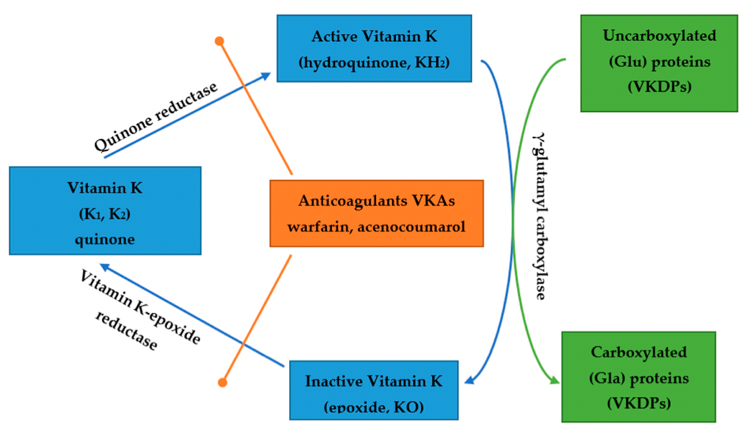There are two types of vitamin K in nature: vitamin K1 and vitamin K2. Vitamin K3 is a synthetic form of vitamin K and a provitamin. Vitamin K1 is mainly found in green leafy vegetables, especially spinach, broccoli, kale, olive oil, and soybean oil, whereas vitamin K2 is found in fish, chicken, milk, liver, cheese, butter, egg yolks, fermented soybeans (natto), and vegetables, but in very small amounts. Although mammalian intestinal bacterial flora can produce vitamin K2, these amounts are insufficient to cover the demand to understand the biological role of Vitamin K—with particular emphasis on cardiovascular and renal aspects.
Vitamin K is less popular compared to other vitamins, but it performs a number of very important functions in the body. The circulation and actions of vitamin K are shown in the figure below. The most important of these is its contribution to calcium homeostasis and anticoagulation. Vascular calcification (VC) is one of the most important mechanisms of renal pathology. The most potent inhibitor of this process, the matrix Gla protein, is vitamin K-dependent. Patients with chronic kidney disease (CKD), both non-dialyzed and hemodialyzed, often have a VK deficiency.
In turn, elevated levels of uncarboxylated matrix Gla protein indirectly reflect vitamin K deficiency and are associated with a higher risk of cardiovascular events in these patients. It has been suggested that vitamin K intake may reduce VC and related cardiovascular risks. Vitamin K is currently proposed for a supplementary and protective treatment for patients with a high risk of VC or bone disorders, particularly in patients with CKD.

Note: VKAs-vitamin K antagonists, VKDPs-vitamin K dependent proteins, Glu-glutamate, Gla-γ-carboxyglutamate, KH2 vitamin K hydroquinone, KO-vitamin K epoxide.
Stępień, A., Koziarska-Rościszewska, M., Rysz, J., & Stępień, M. (2022). Biological Role of Vitamin K—With Particular Emphasis on Cardiovascular and Renal Aspects. Nutrients, 14(2), 262. [Link]
